Can Rabbits Eat Green Beans?
This page contains affiliate links. We may earn money or products from the companies mentioned in this post through our independently chosen links, which earn us a commission. Learn More
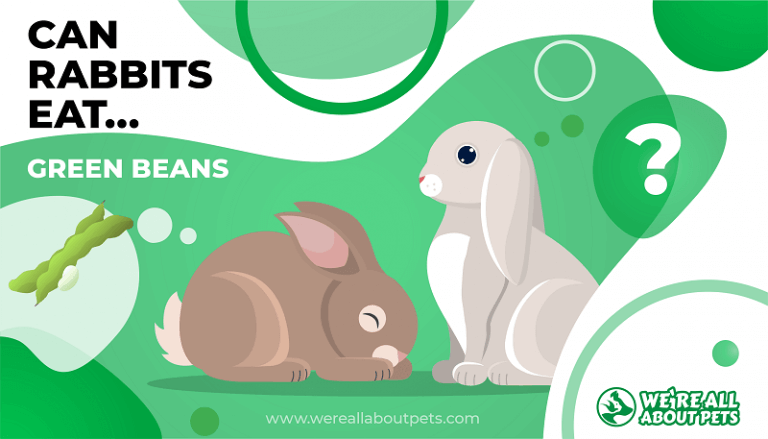
Green beans are easily one of the most popular vegetables on the planet!
Versatile and delicious, they make their way into a variety of dishes. If you are growing green beans or if you’ve been to the farmers market, you’re probably wondering whether you can share these yummy veggies with your pet.
Are green beans okay for rabbits?
In case you’re in a rush, here’s the quick answer: “Yes! Rabbits can eat green beans – but you’ll need to be very careful about introducing this veggie to your bunny.”
That’s only the beginning: In fact, there’s a lot more to the story. Stick around, because we’re about to give you the full scoop with our complete guide to green beans for rabbits.
Green Beans Nutrition Stats
Green beans are nutritious but they’re surprisingly low in calories!
In a one-cup serving of fresh green beans, you’ll get approximately:
- 34 calories
- 8 g carbohydrates
- 7 g fiber
- 2 g protein
- .1 g fat
Green Beans Nutritional Facts
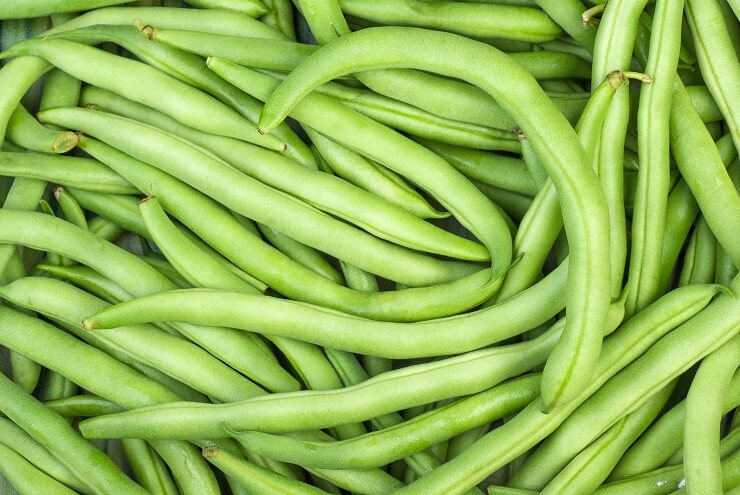
Mom wasn’t kidding when she said green beans are good for you! They are loaded with vitamins, minerals, and antioxidants.
That same one-cup serving offers about:
- 759 iu vitamin A
- 230 mg potassium
- 9 mg vitamin C
- .1 mg vitamin B6
- .2 mg manganese
- 5 mg magnesium
- .1 mg thiamine
- .3 mg pantothenic acid
- .1 mg copper
- 8 mg phosphorus
- 8 mcg vitamin K
- 7 mcg folate
- 7 mg calcium
- 1 mg iron
Can Rabbits Have Green Beans?
Yes, rabbits can have green beans but you’ll need to take precautions as too many beans can cause gas, bloating, indigestion, and a serious – sometimes deadly – condition called GI stasis.
Are Green Beans Good For Rabbits?
When it comes to green beans for rabbits, there’s a bit of a catch-22. On one hand, green beans are highly nutritious.
On the other hand, your bunny can become seriously ill if they eat too many green beans at once. Green beans should not make up a large portion of your rabbit’s diet.
Do Rabbits Like Green Beans?
Yes – most rabbits really like green beans. They seem to appreciate the crunchy texture and unique flavor.
How Many Green Beans Can A Rabbit Eat?
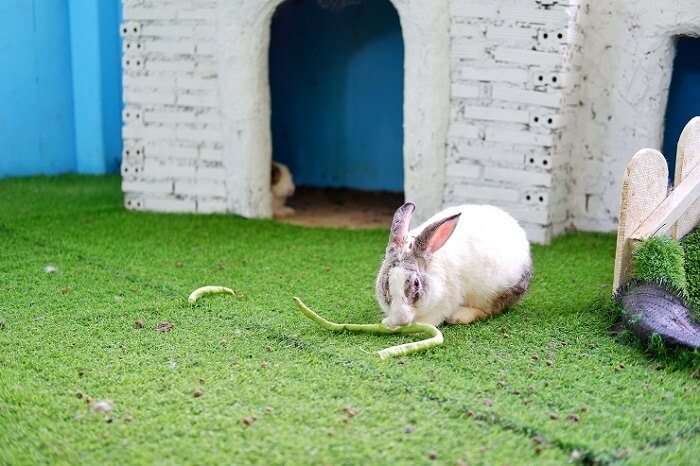
If your rabbit is among those who like green beans, they might be disappointed to hear this answer. “Not many!” Here’s how much green bean to feed your rabbit:
| Age | Amount |
| Baby rabbits | None |
| Adult rabbits | ½ to 1 green bean |
Even though rabbits can eat green beans, there are limits! You can’t just throw a whole handful of beans into your rabbit’s hutch and let them nibble away.
While there are some foods your rabbit can eat in large quantities, it’s very important to limit gas-producing foods like green beans. Since a rabbits digestive system is very sensitive, sudden changes can cause serious trouble.
The first time you introduce your rabbit to green beans, offer just one of the tiny beans from inside the pod, along with a 1 inch section of the pod.
Let your rabbit enjoy their treat and then observe them carefully for the next 24 hours.
Keep an eye out for signs of digestive distress including bloating, diarrhea, or discomfort. In addition, make sure your bunny continues to poop as usual. If they stop eating or pooping, they could have GI stasis. This isn’t likely to occur when you’ve offer just a single bean but it’s important to know what to watch for.
If everything goes smoothly, you can gradually increase your rabbit’s green bean serving size until there eating a full portion. Since this is a food with the potential to cause serious digestive distress, be sure to monitor your bunny carefully as they are making the transition.
Be sure to call your vet if your rabbit seems sick after eating green beans (or anything else you’ve given them). They’ll be able to provide you with specific instructions.
How Often Can A Rabbit Eat Green beans?
Your rabbit can eat green beans once or twice a week, but not on the same day as other foods that have the potential to cause gas. Don’t offer them alongside broccoli, cauliflower, or Brussels sprouts, for example.
The Correct Diet Is Important
Wild rabbits spend their days nibbling on grass and small leafy plants. It’s important to treat pet rabbits to a diet that’s as close as possible to the one their wild cousins enjoy.
A constant supply of fresh hay is essential since it keeps your rabbits digestive system moving.
Besides hay, here’s what to feed a rabbit every day:
- Rabbit food – Your bunny needs to eat a serving of high-quality rabbit pellets every day. Check the label to find out how much to offer.
- Clean, fresh water – Rabbits need a constant supply of water, so it’s really important to remember to rinse and refill their drinking bottle at least once per day.
- Fresh foods – Your rabbit should have a daily “bunny salad” that amounts to about one cup of leafy greens plus a tablespoon of crunchy veggies per two pounds of body weight. You can give it to them all at once or split it into smaller snacks.
- Fruit as a treat – Small amounts of fruit are fine for rabbits. As a general guide, offer no more than about 1 teaspoon of fruit per 2 pounds of body weight per day.
Rabbits teeth never stop growing. Safe, chewable items such as hay cubes, slices of unbleached loofah, untreated softwood sticks, and rabbit toys are vital to your bunny’s health.
What Are Other Healthy Alternatives To Green beans In A Rabbit’s Diet?
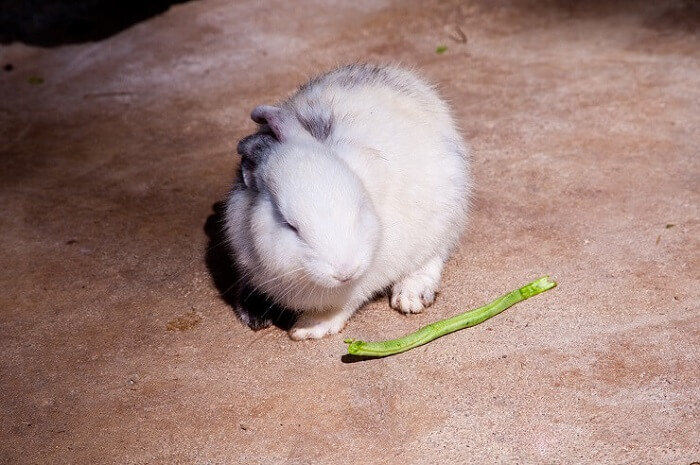
Since your rabbit can only eat green beans on a limited basis, they’ll be glad to discover that there are plenty of other tasty veggies to try.
Next time you’re looking for a healthy bunny snack consider:
- parsley
- cilantro
- carrot tops
- swiss chard
- beet greens
- radish tops
- spinach
- arugula
- romaine lettuce
- butter lettuce
- snow pea pods
- cucumber
- summer squash
- pumpkin
- winter squash
- brussel sprouts
- celery
- cabbage
- broccoli
- broccolini
- dandelion greens
- endive
- escarole
- fennel
- bok choy
- yu choy
- kale
- carrots
- bell peppers
- basil
- strawberries
- blueberries
- blackberries
- raspberries
- apples
- pears
The veggies on this list are just a brief sampling. Many of the same vegetables that you enjoy our great for your rabbit, too.
As you just discovered, certain veggies can be harmful if overeaten. Others are toxic to rabbits.
Be sure to spend a few minutes looking into each new addition to your rabbit’s diet. This is the easiest way to make sure that your offering safe foods in the right quantities.
For now, consider giving your rabbit green beans – just a tiny amount! They’re likely to wiggle their whiskers in appreciation.
Frequently Asked Questions
Are green beans safe for rabbits?
Yes – green beans are safe for rabbits but only in small amounts. Remember to give your bunny's bean a good rinse in fresh water before offering it to them.
Can green beans make my rabbit sick?
Yes, green beans can make your rabbit very sick if too many beans are consumed at once. Be absolutely certain to give your rabbit a slow introduction to green beans and monitor them carefully to ensure that their digestive system is handling the green beans without trouble.
Can my rabbit eat canned green beans?
No! Never give canned green beans to a rabbit. These are high in salt and your rabbit cannot digest cooked foods. Canned green beans can make your rabbit very sick.
Can my rabbit eat frozen green beans?
No, only offer fresh green beans to your rabbit.






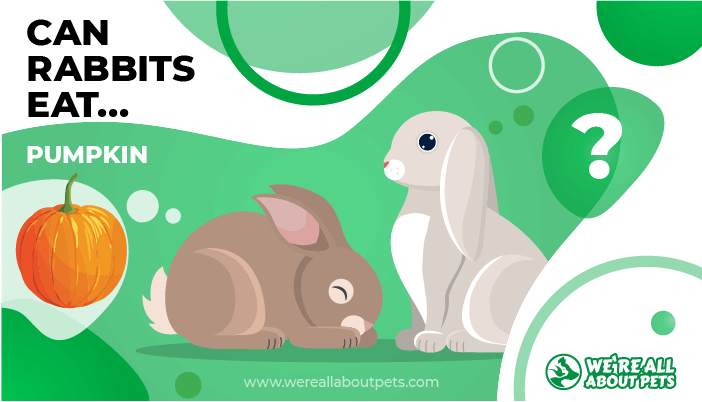
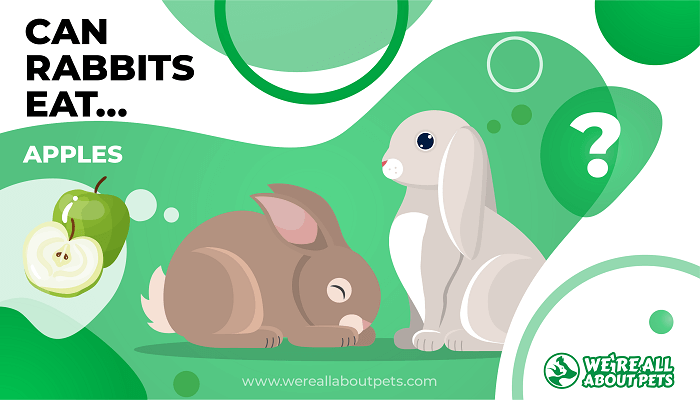
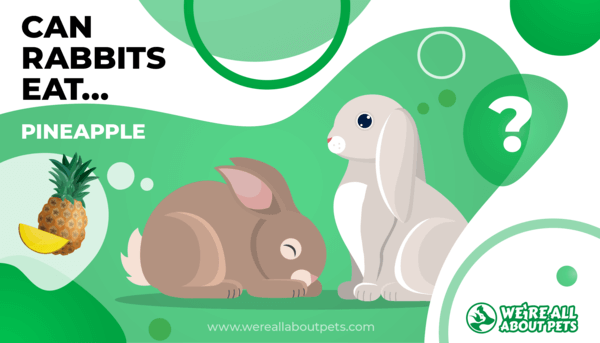
Hersheila
Thank you. Wonderful knowledge
Brenda
Helpful and so informative , thank you !
Jackie Noble
Thank you! Very good information